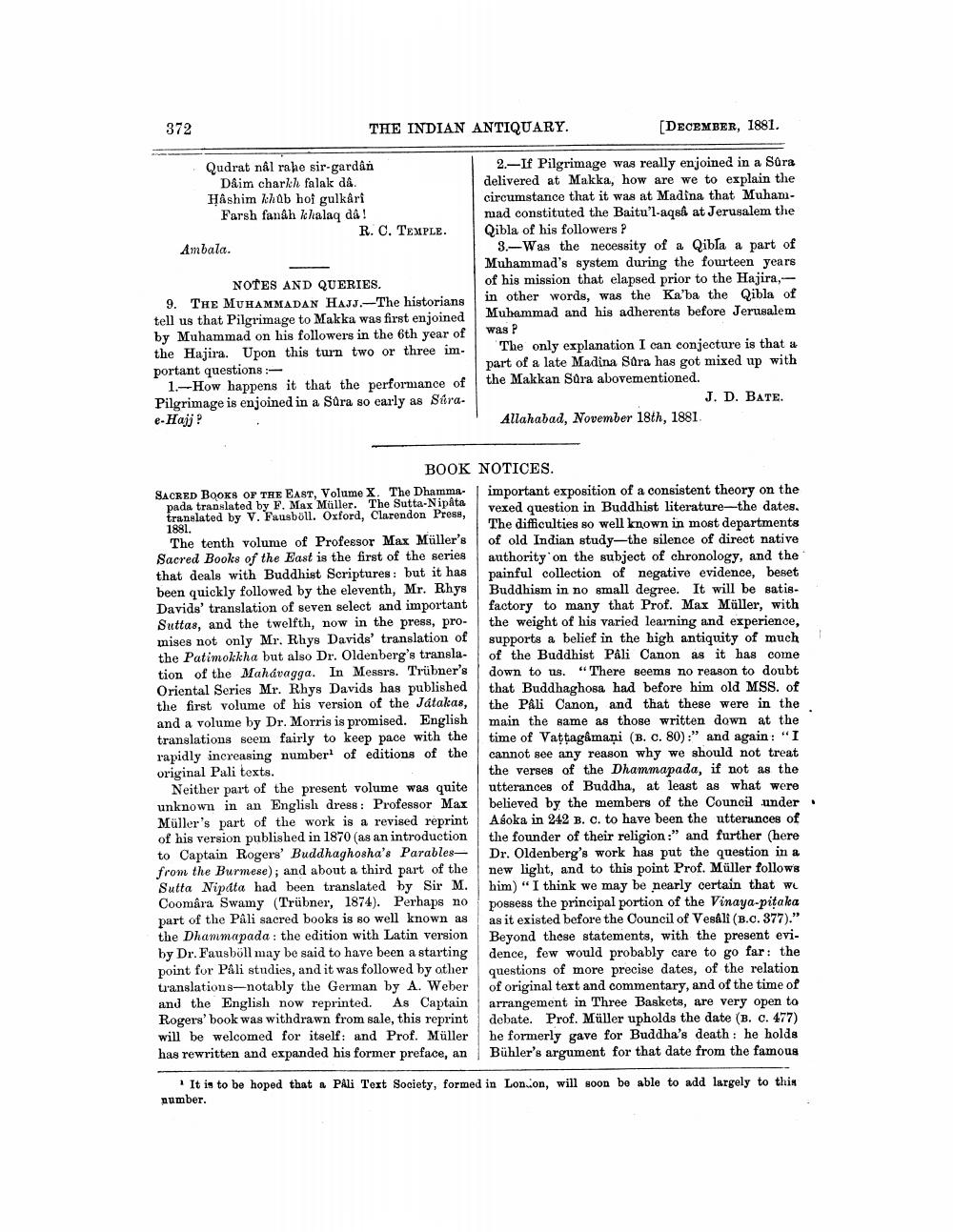________________
372
THE INDIAN ANTIQUARY.
[DECEMBER, 1881.
Qudrat nål rahe sir-gardan
Dåim charkh falak da Hashim khob hoi gulkari Farsh fanâh khalaq da!
R. C. Temple. Ambala.
NOTES AND QUERIES. 9. THE MUHAMMADAN HAJJ.-The historians tell us that Pilgrimage to Makka was first enjoined by Muhammad on his followers in the 6th year of the Hajira. Upon this turn two or three important questions : 1.-How happens it that the performance of
ng it that the performance of Pilgrimage is enjoined in a Sára so early as Sarae-Hajj?
2.- If Pilgrimage was really enjoined in a Sora delivered at Makka, how are we to explain the circumstance that it was at Madina that Muhammad constituted the Baitu'l-aqså at Jerusalem the Qibla of his followers ?
3.-Was the necessity of a Qibla a part of Muhammad's system during the fourteen years of his mission that elapsed prior to the Hajira, in other words, was the Ka'ba the Qibla of Muhammad and his adherents before Jerusalem was P
The only explanation I can conjecture is that a part of a late Madina Sara has got mixed up with the Makkan Sura abovementioned.
J. D. BATE. Allahabad, November 18th, 1881.
BOOK NOTICES SACRED BOOKS OF THE EAST, Volume X The Dhamma important exposition of a consistent theory on the pada translated by F. Max Müller. The Sutta-Nipata
vexed question in Buddhist literature-the dates. translated by V. Fausboll. Oxford, Clarendon Press, 1881.
The difficulties so well known in most departments The tenth volume of Professor Max Müller's of old Indian study-the silence of direct native Sacred Books of the East is the first of the series authority on the subject of chronology, and the that deals with Buddhist Scriptures: but it has painful collection of negative evidence, benet been quickly followed by the eleventh, Mr. Rhys Buddhism in no small degree. It will be satisDavids' translation of seven select and important factory to many that Prof. Max Müller, with Suttas, and the twelfth, now in the press, pro- the weight of his varied learning and experience, mises not only Mr. Rhys Davids' translation of supports a belief in the high antiquity of much the Patimokkha but also Dr. Oldenberg's transla- of the Buddhist PAli Canon as it has come tion of the Mahavagga. In Messrs. Trübner's down to us. “There seems no reason to doubt Oriental Series Mr. Rhys Davids has published that Buddhaghoba had before him old MSS. of the first volume of his version of the Jatakas, the PAli Canon, and that these were in the and a volume by Dr. Morris is promised. English main the same as those written down at the translations seem fairly to keep pace with the time of Vattagamani (B. C. 80):" and again: "I rapidly increasing number of editions of the cannot see any reason why we should not treat original Pali texts.
the verses of the Dhammapada, if not as the Neither part of the present volume was quite utterances of Buddha, at least as what were unknown in an English dress: Professor Max believed by the members of the Council under Müller's part of the work is a revised reprint Aboka in 242 B. c. to have been the utterances of of his version published in 1870 (as an introduction the founder of their religion:" and further (here to Captain Rogers' Buddhaghosha's Parables- Dr. Oldenberg's work has put the question in a from the Burmese); and about a third part of the new light, and to this point Prof. Müller follows Sutta Nipata had been translated by Sir M. him) "I think we may be nearly certain that we Coomâra Swamy (Trübner, 1874). Perhaps no possess the principal portion of the Vinaya-pitaka part of the Pali sacred books is so well known as as it existed before the Council of Vesali (B.C. 377)." the Dhammapada: the edition with Latin version Beyond these statements, with the present evi. by Dr. Fausböll may be said to have been a starting dence, few would probably care to go far: the point for Pali studies, and it was followed by other questions of more precise dates, of the relation translations-notably the German by A. Weber of original text and commentary, and of the time of and the English now reprinted. As Captain arrangement in Three Baskets, are very open to Rogers' book was withdrawn from sale, this reprint debate. Prof. Müller upholds the date (B. c. 477) will be welcomed for itself: and Prof. Müller he formerly gave for Buddha's death: he holds has rewritten and expanded his former preface, an Bühler's argument for that date from the famous
It is to be hoped that number.
PAli Text Society, formed in Lonion, will soon be able to add largely to thin




